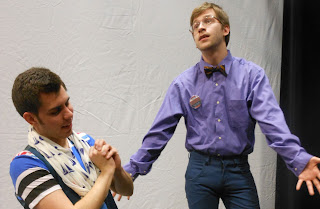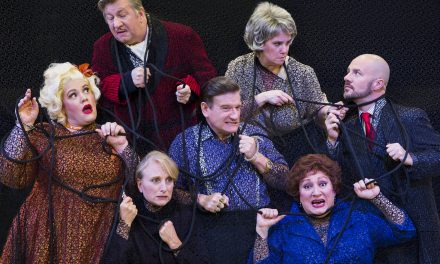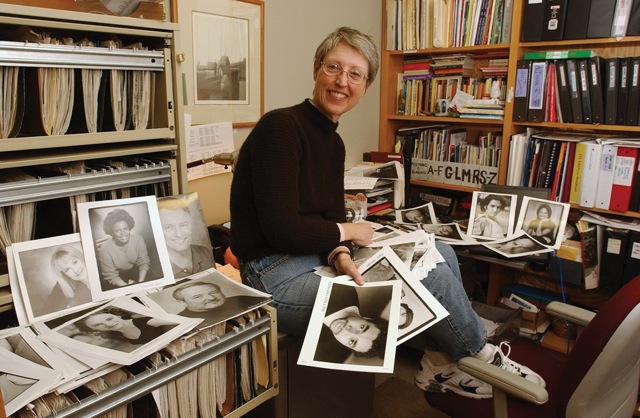 |
| Ben Gierhart as Cal and Daniel Land as Skylor in Abraham Lincoln Was a Faggot. Photo – Pandora Productions. |
Abraham Lincoln Was a Faggot
Written by Bixby Elliott
Directed by Michael Drury
Reviewed by Carlos Manuel
Entire contents copyright © 2013 Carlos Manuel. All rights reserved.
It has taken three years for Pandora Productions to bring to the stage Abraham Lincoln Was a Faggot by Bixby Elliot. First, the company sent out a call for new plays on GLBTQ themes for their New Play Project, receiving 99 submissions. Second, a committee read the submissions and sent nine of them to Artistic Director Michael Drury’s desk. Third, Mr. Drury read all nine plays and picked four semi-finalists. Fourth, the semi-finalists had a selected 20-minute public staged reading for a period of several months, and after each presentation the audience voted for their favorite. After all staged readings were done, and all votes counted, a winner was finally chosen.
Jump to the present when, after a very long trek, Pandora’s new play opened to an almost full house. And while being part of a world premier of a new play is an exhilarating feeling, the excitement of attending Pandora’s production of Abraham Lincoln Was a Faggot slowly banished as I watch the almost 2-hour-and-30-minute production.
But I need to clarify a couple of things: (1) The script by Mr. Elliot and the production by Pandora aren’t bad; they’re just not as thrilling, provoking and daring as the title. And (2) the acting by a superb ensemble is excellent, despite a few line hiccups and slow entrances.
The story focuses on a young high school student name Cal, played with heartfelt emotions by Ben Gierhart, who has written an essay explaining that the 16th president of the United States could have been gay.
The play starts on the day Cal is about to give a reading of an essay in front of a group of people who have gathered at the Ford Theatre in Washington DC. Once he’s about to read his essay, a shot is heard. Through a flashback, the play starts months before Cal makes it to Washington, and slowly, very, very slowly, the story moves forward to the present.
As Cal researches the life of Abraham Lincoln, candidly played with charm by Eric Sharp, we witness, once again through flashbacks, Abe’s life from childbirth to the moment he was shot at the Ford Theatre in Washington DC. We are also witness to Cal’s life as a high school teenager living in the closet, having his first kiss, meeting his first boyfriend, and inhabiting a distant and cold relationship with his mother. Lastly, we also take part in the story of Geoffrey (Cal’s uncle and brother to his mother), portrayed with sharp seriousness by Obadiah Ewing-Roush, who is living an “in-the-closet” relationship with his partner Buck, gaily played by Christopher Gilbert.
As these three storylines move forward, we learn about Abe’s intimate life with Joshua Speed, better known as Shua, played by Zachary Burrell, who displays an incredible versatility portraying many other different characters in addition. We learned about Abe’s intimate encounters with a military soldier known as Derickson, played here by Nick Duett, who, like Mr. Burrell, does a fantastic job at playing many other characters. And finally, we also learn about Abe’s turbulent relationship with Mary Todd, played with exuberance and borderline bipolarity by Meg Caudill.
We also are witnesses to Cal’s distance relationship with his mother Susan, fantastically played with a troubled heart by Collette Delaney, who joined the cast so late in the rehearsal process that her picture and bio do not even appear in the program but in an insert. (I only mentioned this fact because Mrs. Delaney acts with the authority of someone who had been there from day one.) And of course, Cal’s struggle to come out of the closet as he meets his boyfriend, Skylor, played by newcomer Daniel Land, whose portrayal is colorfully flamboyant and extremely funny.
Lastly, we are part of the Geoffrey and Buck’s closeted relationship, filled with secret sexual fantasies, anonymous sex encounters, and, as in the other two storylines, a lack of communication between the individuals.
As I mentioned before, each cast member in this production is excellent, including Kate Holland who plays Patti, a museum tour guide, at the “The Soldier’s Home” where, it is said, “Lincoln spent a lot of time in the company of other men.” Ms. Holland embraces the museum guide with so much serious hilarity that for me, besides the prologue where Cal lists the ‘bad words” not endorsed by his high school, this was the highlight of the evening.
Despite the fact that the script is the winner out of 99 submissions, the production is decent, and the acting is excellent, there are three things that make this production not as memorable as its title: an over-written script, a cumbersome set, and a lack of definite direction.
In my opinion, the script could benefit from some rewrites, edits and cuts. Some of the scenes, although containing funny one-liners, could easily be omitted without affecting storylines. And the random “singing transitions” as well as the scene about Michael Jackson can go away too. Honestly, it does nothing for the story or the plot. It serves no purpose. It is clear that Mr. Elliot, as a playwright, knows how to structure a play, using flashbacks, parallel stories, bending time and space, presenting historical facts as part of dialogue, and even mixing an episodic plotline with a circular one. And even though the three storylines thematically come together, the fact is that the too many short scenes and jumps from one to the other take away from what could be a fast, sharp comedy filled with history and hysteria.
When it comes to the production, the set by Karl Anderson, although very well-done and representative of the cold marble off-white buildings of Washington DC, becomes a cumbersome obstacle for the transitions between scenes. Actors have to travel from offstage to the center while climbing stairs or rapidly walking across a vast stage; it only slows down the action and the physicality of the piece. I believe the set was adequate as a representation of the grand steps of the Lincoln Memorial but impractical for this type of play where actors need to be in and out fast as possible, and lights have to change so quickly that at times, transitions looked chaotic and confusing. A one level platform would have been better.
And that brings me to the co-directing by Michael J. Drury and Tim Kitchen, which I believe was missing something in the sense of characters’ physical and emotional motivations. Most of the time actors seemed to rush on stage, moving without purpose except to be in the “right spot” just in time for light changes or scene transitions. This makes the staging look weak and unmotivated. There’s one particular scene towards the end of the play where this is very obvious. In this scene, Susan, Carl’s mother, suddenly panics and decides her son won’t be reading his essay (there is a reason for this that I won’t reveal here.) Mrs. Delany portrays this moment with such conviction that the fear and desperation felt by any mother is palpable. The problem, however, lies in the fact that while the actress is emotionally committed and desires to get out of there as fast as possible, physically she can’t go anywhere because she’s surrounded by obstacles—actors on one-side, cubes on the other, and audience in the front. The audience can feel the character wants to get out of there, and we can also sense the actor feels that need, yet it doesn’t happen. Instead, the actor turns away from everyone while ordering her son to go with her. The character’s physical actions don’t match the character’s state of mind or emotions. This has nothing to do with character’s choice or motivation but rather, as powerful as this moment seems, it is also awkward because the scene lacks directorial understanding and drive.
Despite my observations, Abraham Lincoln Was a Faggot is a play everyone should see. The idea that Lincoln could have been gay is intriguing. The fact that the actors do an incredible job with the story and the many characters they portray is superb. And the strength Pandora Productions shows by taking a risk with such play and title is outstanding. As I said at the beginning, it isn’t a bad production. It is, in fact, entertaining yet a little long. But these are the risks any theatre company takes when producing new works. And I would prefer to see this kind of play anytime rather than settling down to the familiar and safe things that are sure to work all the time.
Abraham Lincoln Was a Faggot
March 14-24, 2013
Pandora Productions
at The Henry Clay Theatre
604 S. Third St.
Louisville, KY
(502) 216-5502





Excellent acting, but even that can’t save the hideous script full of one liners. I can only attest to the 1st half of the play. I was so put-off with the lack of direction I left during intermission. My ass literally ached from sitting thru this awful play. I’ve been a Pandora subscriber for two years now, and each year they have to have at least one play to bore the crap out of you! This is this season’s Yawn!
Everyone is entitled to their own opinion and the job of a critic is to reveal that person’s thoughts. I would suggest however that Mr. Manuel check his historical facts. For those of us who are “history nuts”, it would give more credit to his review. Case in point is that President Lincoln was the 16th President of the United States not the 17th.